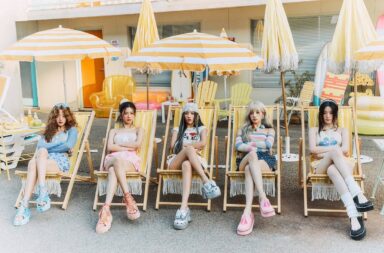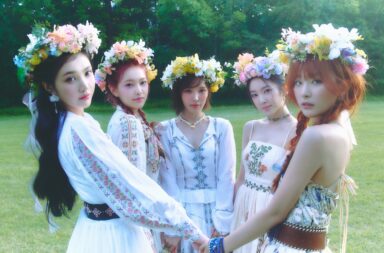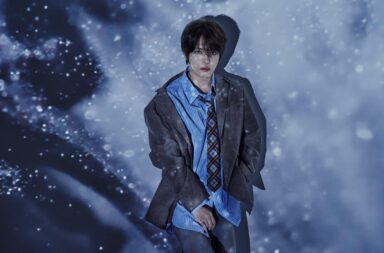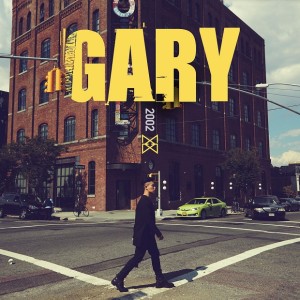 Since last year’s Mr. Gae, Gary from Leessang has continued to release more solo work. He collaborated with Jung-in on a couple of singles — even winning an award on Music Core despite not promoting on music shows. 2002 is Gary’s first full studio album released as a soloist.
Since last year’s Mr. Gae, Gary from Leessang has continued to release more solo work. He collaborated with Jung-in on a couple of singles — even winning an award on Music Core despite not promoting on music shows. 2002 is Gary’s first full studio album released as a soloist.
2002 has a lot to offer in its ten tracks. There are features on every song — with some amassing three guest features on it. Gary stated that he worked on the album with the same type of mindset that he had when he worked on the first Leessang album in 2002. What does come through is a sense of clarity in each song. There is an artistic edge to each and Gary’s artistic voice and compelling story rises above it — whether it is from the easy-going style in which he rides a beat or his thoughtful metaphors.
The first song off the album is titled “2002 Spring.” Koonta features on the song, which sets the tone of the album. “2002 Spring” is spacey in its production and adds a lot of melodic notes in between the snares. Koonta also has a soulful approach to his singing that harkens to someone reflecting on older times. This song spells out those memories of 2002. Gary paints a vivid picture of the times. There are certain colors her remembers — from the white wallpaper in the room where he would write his lyrics to the golden flowers by the Han River that he would pass on his way to recording. He adds on how he struggled to find meaning to live. Gary is able to add a personal touch to the song, and it starts the album off on a great note.
“Doong Doong,” which features Skull and Deepflow, speeds up the rhythm and adds more ostentatious elements with horns building up the atmosphere and adding flare to the tone of song. This song reflects moments of being proud of yourself. Gary reflects on his place and role in changing and influencing the Korean rap game. He talks about this in relation to the number of rap lines and words he’s contributed during his time in the industry. Not just a boost to one’s ego, it fits in the album as it functions as a contemplative boast.
“Joa” featuring Jay Park is a slow jam. It is about sex and how Gary cannot stop thinking about this girl. The chorus comprises Gary listing out things that he likes about her — he talks about physical attributes such as her butt, tongue, smile, eyes, and nose. There is an intimacy to it as he recounts the jokes they would crack when they are being affectionate towards one another.
The next song on the album is “Rap” featuring DJ Pumkin. It continues that nostalgic glance back at the year 2002. There are some piano chords that open the song along with a static noise emphasizing the wistful nature of the story. I appreciate the layers in the production such as the little bits of vocalization that Gary raps over. The chorus has a refrain that uses “rap” as the key rhyming phrase. It reinforces this idea of how much rapping has shaped his life. It is something that he does for a living, something that he is expected to do, and something that he pours himself into when other things in his life gets complicated.
Aside from “Joa,” the other major title song is “Get Some Air.” Miwoo‘s vocals are prominent as she sings the chorus and adds ad-libs during Gary’s rapping. “Get Some Air” touches on a tough breakup that Gary experiences and how he deals with the resulting emotional turmoil. Gary emphasizes a monotony to life in this story:
“Even without you, time is ticking away
Since you don’t call, my phone is just off”
However, even though you may feel down and out from this breakup, the song suggests that things get better. Miwoo sings words suggesting the troubled parties to breathe and know that you are not alone. The message is great and Miwoo’s voice truly stands out here.
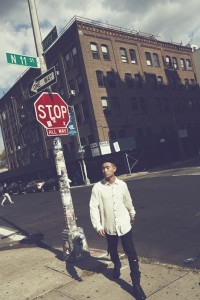 The production takes another turn with “Mushi Mushi.” While most of the album is composed by Groovy Room & Gary, this song was composed by Simo, Don Mills, and Gary. Park Myung-ho, Double K, and Don Mills all contribute a verse on “Mushi Mushi.” It plays like a cypher where each rapper lays down their respective verses. The base is heavy and the hype is real.
The production takes another turn with “Mushi Mushi.” While most of the album is composed by Groovy Room & Gary, this song was composed by Simo, Don Mills, and Gary. Park Myung-ho, Double K, and Don Mills all contribute a verse on “Mushi Mushi.” It plays like a cypher where each rapper lays down their respective verses. The base is heavy and the hype is real.
Slowing things back to a midtempo, “Halyang Dream” with John Park reverts back to that slower flow. The song has a piano melody that lies under the beat. Gary paints a story of a dream that grows and changes as he continues his days. It fits the tone of the album which has that running motif of reflecting on the Gary from over a decade ago.
The next song is “Shipapa” features frequent collaborator Jung-in as well as Miwoo. Jung-in and Miwoo both have soulful voices that add a lot to this funky song. The upbeat nature probably would have fit better leading up to “Mushi Mushi” in terms of BPM. The song also changes the subject matter by talking about relieving stress. It is still a great song on its own, but in terms of its place in 2002, it does feel a tad misplaced. Even so, Jung-in and Miwoo both sound phenomenal.
“Alochol Feeling” sees the production work shared by Gary and Simon Janlov. The composition has a heavier feel and along with “Mushi Mushi” stand out as productions with a different sensibility. The lyrics lay down some deep ruminations that Gary has amidst feeling drunk:
“We are living in the middle of a sometimes huge prison
The truth always closes its eyes in front of power”
The song has a grimier feeling as it wallows in the haze of intoxication, and the beat is a nice fit for the rapping. The additional clinking and plucky keyboard sounds add an almost psychedelic aspect to the song. There is a weary sense of jadedness that gets temporarily appeased by the alcohol feeling.
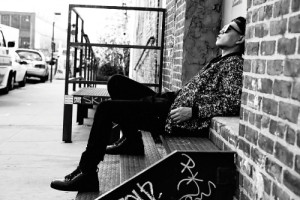 The last song on 2002 is “Empty” which features Yongjoon of Brown Eyed Soul. It sports a jazzy tone and the production was helmed by Radio Galaxi and Gary. This break up, mentioned a few tracks prior, must have had a big effect on Gary. He thinks about the type of emptiness he feels on that day and really, in the past year since being without this person. The production actually steers closer to the midtempos of the first half and works well as the last track because of the melancholic nature of the song.
The last song on 2002 is “Empty” which features Yongjoon of Brown Eyed Soul. It sports a jazzy tone and the production was helmed by Radio Galaxi and Gary. This break up, mentioned a few tracks prior, must have had a big effect on Gary. He thinks about the type of emptiness he feels on that day and really, in the past year since being without this person. The production actually steers closer to the midtempos of the first half and works well as the last track because of the melancholic nature of the song.
“Empty” works well to summarize the tone of the album. As it fades out in a static haze, 2002 has truly recalled a time in Gary’s life defined by love, rapping, and vibrant colors in his memory. Each track characterizes some part of his life since he first started working with Gil on Leessang’s début album. Between those times where he reflects on hardships of creating his album, in experiencing love, and in dealing with heartbreak, we really get to delve into the psyche of Gary.
2002 is a well-told story with a lot of ups and downs. We are reminded of Gary’s talents in storytelling, and also get opportunities to tease his rap skills when he flows with other rappers. Although the album does go through a few shifts in tone, it is an absolute work of art. Gary confidently commands a strong sense of his own voice and lays out a narrative of a complicated human who faces certain struggles while pursuing what he loves to do. What I appreciate about 2002 is that Gary is authentic when he raps about his life. Gary rides the beat and delivers a nostalgic wrapped album that is at once heartbreaking and hopeful at the same time.
Album Rating: 4.75/5
(Leessang Company, Jungle Entertainment, YouTube. Lyrics via Pop!gasa & sleeplessaliana. Images via Leessang Company)
